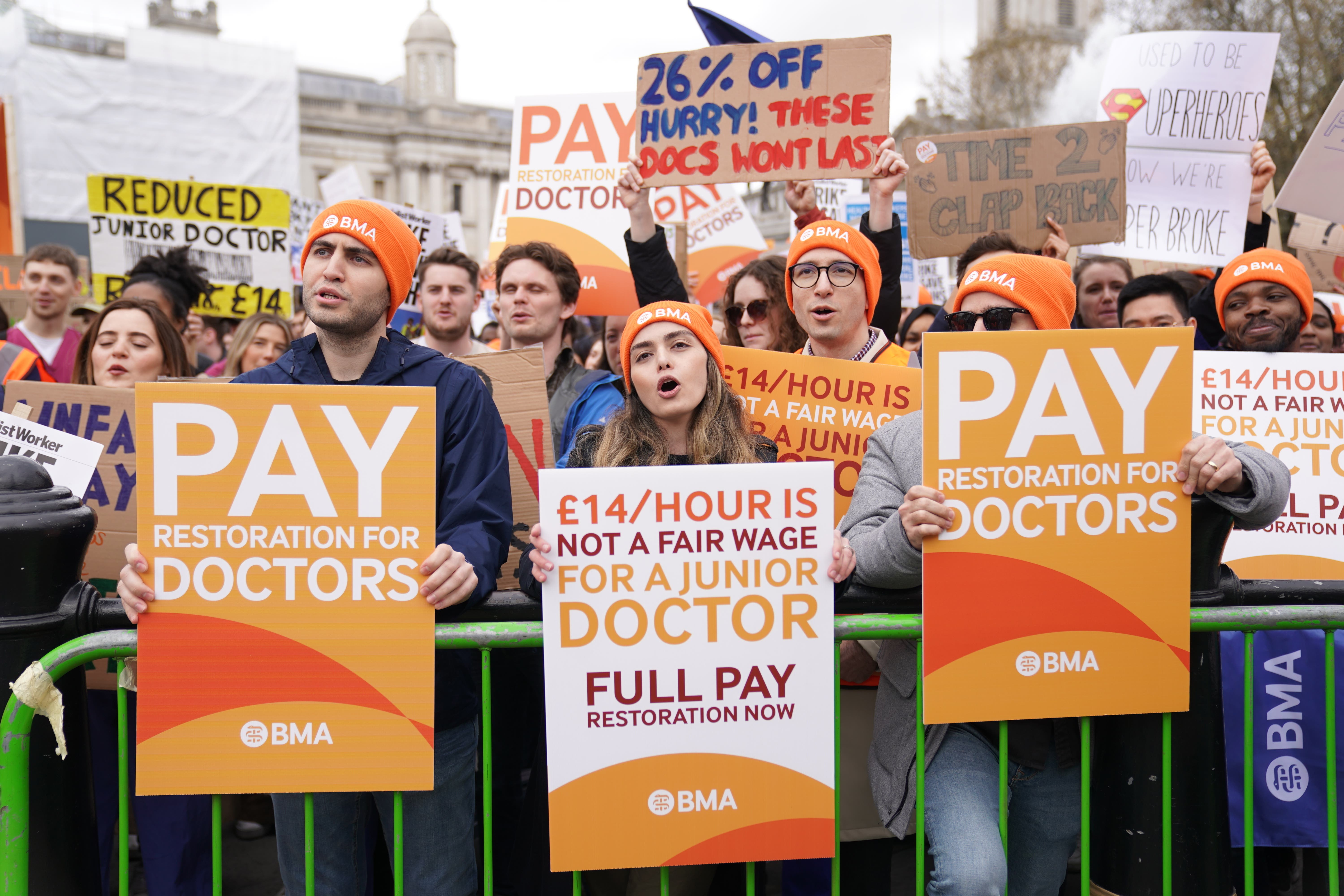Senior medics demand higher overtime to cover for striking junior doctors
Hundreds have said they will not provide cover unless their employers agree to the demand.

Your support helps us to tell the story
From reproductive rights to climate change to Big Tech, The Independent is on the ground when the story is developing. Whether it's investigating the financials of Elon Musk's pro-Trump PAC or producing our latest documentary, 'The A Word', which shines a light on the American women fighting for reproductive rights, we know how important it is to parse out the facts from the messaging.
At such a critical moment in US history, we need reporters on the ground. Your donation allows us to keep sending journalists to speak to both sides of the story.
The Independent is trusted by Americans across the entire political spectrum. And unlike many other quality news outlets, we choose not to lock Americans out of our reporting and analysis with paywalls. We believe quality journalism should be available to everyone, paid for by those who can afford it.
Your support makes all the difference.NHS trusts could face significant disruption during junior doctor strikes after hundreds of senior medics threatened not to provide cover for colleagues on picket lines.
More than 800 hospital consultants in London have said they will not provide cover for striking junior doctors unless their employers agree to pay a higher overtime rate set by the British Medical Association (BMA).
Junior doctors in England are set to walk out for 72 hours from 7am on Wednesday June 14.
A new letter, signed by 8.7% of London’s consultants, states some NHS trusts outside of the capital have agreed to pay the higher rate, the Health Service Journal reported.
The medics, who wrote the letter independently of the BMA, said the NHS in London has an inconsistent stance on the higher pay rate compared to other regions.
It comes as Health Secretary Steve Barclay said there needs to be “movement on both sides” amid the dispute.
He insisted the Government’s door remains open, but accused the BMA’s Junior Doctors Committee of refusing to budge from its 35% pay demand, despite bringing an intermediary to negotiations.
Mr Barclay told BBC Breakfast: “I don’t think a 35% pay rise is a reasonable demand. That’s really what we need to see some movement on.
“We hugely value the work that the junior doctors do, but to date they haven’t been willing to move at all from 35%, and in fact actually move to 49% if you added in next year.”
The Junior Doctors Committee has refused to move at all from its 35% demand, and that’s really been the sticking point
He told LBC radio: “We had around three weeks of talks with them. They requested that we bring in an intermediary – a very senior NHS leader, Kathy McLean, a very respected figure which the Government agreed to – but notwithstanding that, the Junior Doctors Committee refused to move at all from their request for a 35% pay rise.
“I don’t think it is fair and reasonable.
“We want to work with the junior doctors, we massively value the contribution they make – they are key to our elective recovery and getting our waiting times down.
“But a 35% pay rise, I don’t think is fair and reasonable, and that’s been the sticking point so far.
“Obviously the Government is very keen to engage with them, but we can’t do so whilst (they are) insisting on further strikes.
“Obviously there is an impact on patients when these strikes take place, and we want to work constructively with them.
“But there’s got to be movement on both sides and the Government has signalled its willingness to move. To date, the Junior Doctors Committee has refused to move at all from its 35% demand, and that’s really been the sticking point.”
Dr Vivek Trivedi and Dr Robert Laurenson, co-chairs of the BMA Junior Doctors Committee, said: “With junior doctor pay having eroded by 26% in the last 15 years, and with double-digit inflation this year, the 5% offer the Government made would have amounted to yet more pay cuts.
“That is in no way a fair or reasonable offer and will not help stem the exodus of junior doctors from the NHS.
“The Health Secretary can come to us with a credible offer at any time – preventing any future strike action sits firmly within the gift of the Government.”
Commenting on the letter, a BMA spokesperson said: “The BMA’s rate card has been developed to address the fact that for too long, trusts have been continually leaning on consultants to work many extra hours in excess of their normal contracts, not just during strike days but in the face of rota gaps and chronic workforce shortages, and with an emphasis on clearing the record treatment backlog.
“Crucially, the principle is to ensure that NHS trusts adopt a fairer and more consistent approach to overtime pay nationwide, with rates based on those already being offered in parts of the country to reflect the market value of doctors’ work.
“This letter, put together by grassroots doctors in the capital, emphasises the strength of feeling among the profession that their time, expertise and well-being are not being fairly and appropriately valued by trusts, and thus underlining the very reasons that the rate card was developed in the first place.”